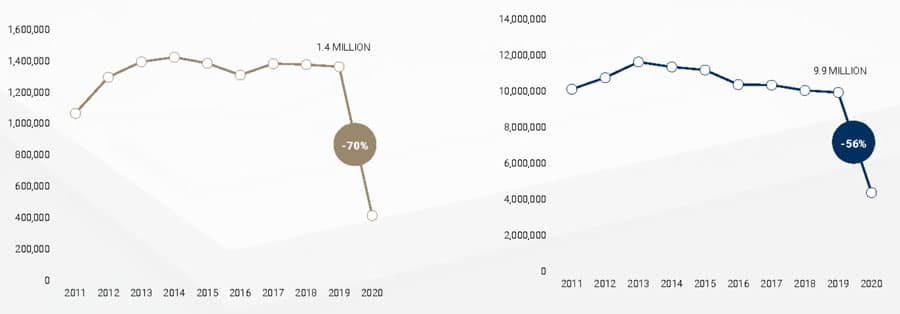The shape of ELT through 2023: Recovery and re-creation
- A recent webinar takes a high-level view of the English Language Teaching sector and the recovery of language travel through 2023
- Panelists shared a broad expectation that ELT enrolments would recover to roughly 60% of pre-pandemic levels by 2022 and then continue to rise the year following
A recent webinar from industry consultancy BONARD takes a high-level view of the English Language Teaching (ELT) sector and the recovery of language travel through 2023. The webinar featured a panel of executive staff from peak bodies in three major language destinations: Jodie Gray, Cheryl Delk-Le Good, and Gonzalo Peralta, the executive directors of, respectively, English UK, EnglishUSA, and Languages Canada.
BONARD's trends analysis across the eight leading ELT destinations – the US, Canada, Australia, UK, New Zealand, Ireland, South Africa, and Malta – finds there was an overall drop of -70% in terms of language enrolments from 2019 to 2020. Student weeks fell by a combined -56% over the same period. As the following charts reflect, that sharp COVID-induced decrease last year followed a downward trend in student weeks, from roughly 2015 on, as average weeks per booking gradually declined over those several years.

In total, the research team counts 159 language centres that closed in 2020, and another 73 closures through September 2021. For centres that have hibernated during part of the pandemic, or otherwise dramatically reduced capacity, the challenge now is to time a scaling back of operations to keep pace with returning student mobility.
BONARD projects that ELT bookings will return to around 60% of pre-COVID volumes in 2022, gradually increasing to 90% in 2023. This compares to the most recent edition of the ALTO Pulse Report for July 2021 which, based on a broad survey of schools and agents, anticipates that volumes will return to 60% of pre-COVID levels in the last quarter of 2022, rising to roughly 70% in the first months of 2023.
"There is considerable pent-up demand and students are eager to travel," said Ivana Slobodnikova, senior research manager at BONARD in her opening remarks during the session. "However, the return is going to be rather gradual as opposed to a more sudden return to student mobility."
The factors that are expected to most determine the pace of that recovery are:
- Vaccination rates in source markets
- Vaccine recognition/acceptance in destination countries
- Evolving rules around under-18 travel
That observation casts into sharper relief some of the recent developments in major destinations, such as the expanding lists of approved vaccines for Australia, the UK, and Canada, and the new rules for 18-years-and-younger travellers to the UK.
Recovery, re-creation, or renovation?
There was considerable discussion among the webinar panelists over the nature of the industry's experience now and over the next couple of years.
"Is this a recovery?" asked Languages Canada Executive Director Gonzalo Peralta. "Or is this a re-creation of our sector? There are too many underpinning structures (of the industry) that have been changed forever…In the process of welcoming a student, there are so many potential points of disturbance. It's not just getting a visa anymore; it's not just getting a plane ticket or even finding a homestay. It's about getting your vaccines, and proving that you (are vaccinated). It's about all of the visa officers understanding that proof. Once you are here, the schools have rules about how many people can be in the room and (public health rules) keep changing all the time. Disruption is the norm and we want to communicate to students that, if that is now the norm, that the doors are open and we are welcoming you in a safe way."
The overall impression from the discussion is of a sector that aims to be even more agile and adaptable going forward, and to build on its historical strengths to deliver great experiences for students and partners.
There were two other prominent themes in the discussion. First, that scaling back up will be challenging in almost every aspect of school operations, including staffing, homestay, and support services.
The panelists also agreed that a commitment to service – even more, to student care – and a focus on people and trusted relationships were enduring characteristics of the sector that would carry forward into the latter stages of the pandemic and beyond. "A lot of what we're doing as a sector now, when we're talking to government and working with other partners and stakeholders, is both of course looking at what we can do now to help businesses survive," said English UK's Jodie Gray. "But we're also looking at something slightly longer-term – to look at how we build on what we've got to build a better and stronger industry for the future."
For additional background, please see:
















